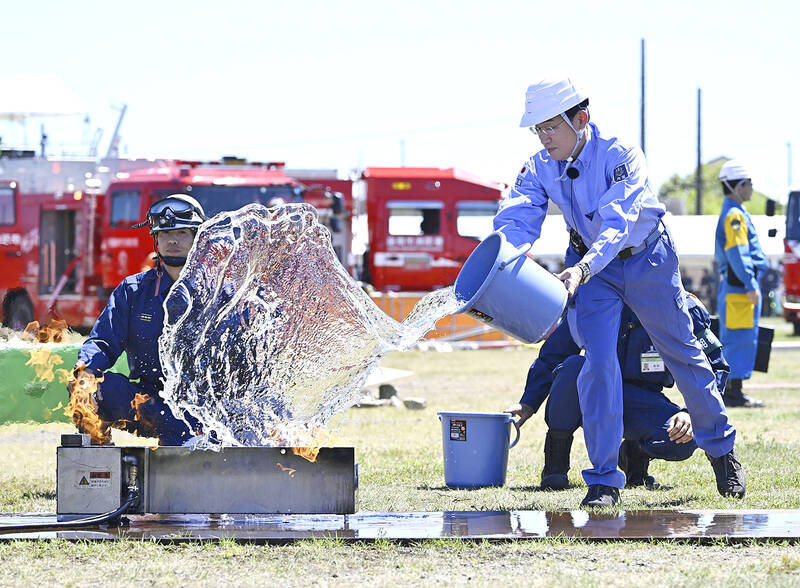Japanese Prime Minister Fumio Kishida yesterday staged a televised disaster drill based on a fictional earthquake in the capital region, as his country marked the centennial of the real-life 1923 Great Kanto Quake that killed more than 100,000 people.
The magnitude 7.9 earthquake that struck the Sagamihara area southwest of Tokyo on Sept. 1, 1923, just before noon triggered a widespread inferno in the region, causing most of the victims to perish in the fire. The blaze destroyed nearly 300,000 Japanese paper-and-wood homes, as the country suffered major social and economic damage just as it was seeking to modernize.
In the aftermath, thousands of ethnic Koreans were killed as police and others responded to baseless rumors that Koreans were poisoning wells. The rampage has never fully been acknowledged by the government.

Photo: AP
Japanese officials are worried another devastating tremblor could happen again. The drill yesterday simulated the aftermath of a fictional magnitude 7.3 temblor in central Tokyo at 7am. Kishida and his Cabinet ministers, wearing matching light-blue uniforms, walked to the prime minister’s office for an emergency response meeting to discuss initial measures with hypothetically hard-hit Sagamihara City, the 1923 epicenter.
Japan, which sits on the so-called Pacific “ring of fire,” is one of most quake-prone countries in the world. A magnitude 9.0 quake on March, 11, 2011, off Japan’s northeastern coast triggered a massive tsunami, killed more than 18,000 and triggered a nuclear disaster.
Earthquake drills were also conducted at municipalities and schools across the nation. At elementary schools, children squatted under desks to protect their heads from falling objects.
Kishida was to join a joint earthquake drill hosted by Sagamihara and joined by eight citie, including Tokyo.
Japanese Chief Cabinet Secretary Hirokazu Matsuno told reporters that Sept. 1 this year represents more than the centennial of the Great Kanto Quake. It serves as a lesson to building structures with more resilience to quakes and fire.
“We will not let the memories of the Great Kanto Quake weather away and [will] do our utmost to take comprehensive measures” as the country braces for another big one in Tokyo and elsewhere, Matsuno said.
In other news, Japan’s summer this year was the country’s hottest since records began in 1898, the weather agency said yesterday.
“Average temperatures in Japan are the highest for summer since 1898,” the agency said.
From June to last month, the agency recorded “considerably higher” average summer temperatures in “northern, eastern and western Japan,” it said in a statement.
“The average temperature anomaly in Japan, based on observations at 15 locations, was +1.76oC, far exceeding that of 2010 (+1.08oC), which was the highest since statistics began in 1898 and the highest for summer,” it said.
“Warm air tended to cover northern Japan and warm air flowed in from the south, resulting in considerably higher average summer temperatures in northern, eastern, and western Japan,” it added.

Kehinde Sanni spends his days smoothing out dents and repainting scratched bumpers in a modest autobody shop in Lagos. He has never left Nigeria, yet he speaks glowingly of Burkina Faso military leader Ibrahim Traore. “Nigeria needs someone like Ibrahim Traore of Burkina Faso. He is doing well for his country,” Sanni said. His admiration is shaped by a steady stream of viral videos, memes and social media posts — many misleading or outright false — portraying Traore as a fearless reformer who defied Western powers and reclaimed his country’s dignity. The Burkinabe strongman swept into power following a coup in September 2022

‘FRAGMENTING’: British politics have for a long time been dominated by the Labor Party and the Tories, but polls suggest that Reform now poses a significant challenge Hard-right upstarts Reform UK snatched a parliamentary seat from British Prime Minister Keir Starmer’s Labor Party yesterday in local elections that dealt a blow to the UK’s two establishment parties. Reform, led by anti-immigrant firebrand Nigel Farage, won the by-election in Runcorn and Helsby in northwest England by just six votes, as it picked up gains in other localities, including one mayoralty. The group’s strong showing continues momentum it built up at last year’s general election and appears to confirm a trend that the UK is entering an era of multi-party politics. “For the movement, for the party it’s a very, very big

ENTERTAINMENT: Rio officials have a history of organizing massive concerts on Copacabana Beach, with Madonna’s show drawing about 1.6 million fans last year Lady Gaga on Saturday night gave a free concert in front of 2 million fans who poured onto Copacabana Beach in Rio de Janeiro for the biggest show of her career. “Tonight, we’re making history... Thank you for making history with me,” Lady Gaga told a screaming crowd. The Mother Monster, as she is known, started the show at about 10:10pm local time with her 2011 song Bloody Mary. Cries of joy rose from the tightly packed fans who sang and danced shoulder-to-shoulder on the vast stretch of sand. Concert organizers said 2.1 million people attended the show. Lady Gaga

SUPPORT: The Australian prime minister promised to back Kyiv against Russia’s invasion, saying: ‘That’s my government’s position. It was yesterday. It still is’ Left-leaning Australian Prime Minister Anthony Albanese yesterday basked in his landslide election win, promising a “disciplined, orderly” government to confront cost-of-living pain and tariff turmoil. People clapped as the 62-year-old and his fiancee, Jodie Haydon, who visited his old inner Sydney haunt, Cafe Italia, surrounded by a crowd of jostling photographers and journalists. Albanese’s Labor Party is on course to win at least 83 seats in the 150-member parliament, partial results showed. Opposition leader Peter Dutton’s conservative Liberal-National coalition had just 38 seats, and other parties 12. Another 17 seats were still in doubt. “We will be a disciplined, orderly